No spring kittens: Meet some of Prince Edward Island's oldest cats
Bagel the cat spends most of her days sitting around, smelling the breeze as it comes in through the window. She sometimes listens to the birds, but she can't see them. Bagel is blind — and she's 24 years old.
"It really was probably in the past 10 years that I started saying, 'Holy smokes, this is a lifetime commitment, above and beyond anything I ever knew,'" said her owner, Aaron Jargo.
Bagel lives in a farmhouse near Murray River with Jargo, his wife Christy, and their three dogs. But she didn't start her life there.
Jargo moved to North Carolina in his late 20s and decided to get a cat. He'd never had one before, but it wasn't long until he found the kitten that he'd eventually name Bagel.
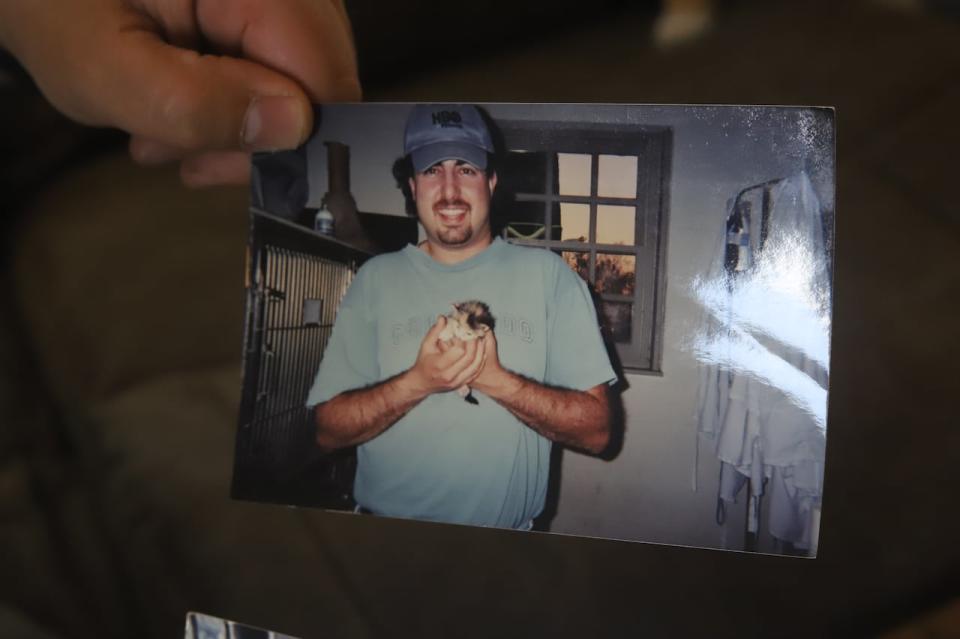
"She was considered a runt of her litter, very tiny," he remembers. "They said that she would need special treatment and special care and she might not live very long, actually. And I said, 'OK, challenge accepted.'"
Caring for a senior
Bagel was adopted in April of 2000 and named after Jargo's love of baking. Playful and the boss of the house, Bagel now cozies up on a heated bed with a nearby fountain providing fresh water.
Over time, Bagel developed cataracts, which have slowed her down a little.
"She gets around very well on her own. She knows where she's at, she's got that sense of location," Jargo said. "I always pick her up and hold her in my chest…and while I'm talking to her, I'm pretty confident she recognizes my voice and the way I hold her. She just purrs up a storm, opens herself up, lets me rub her belly."
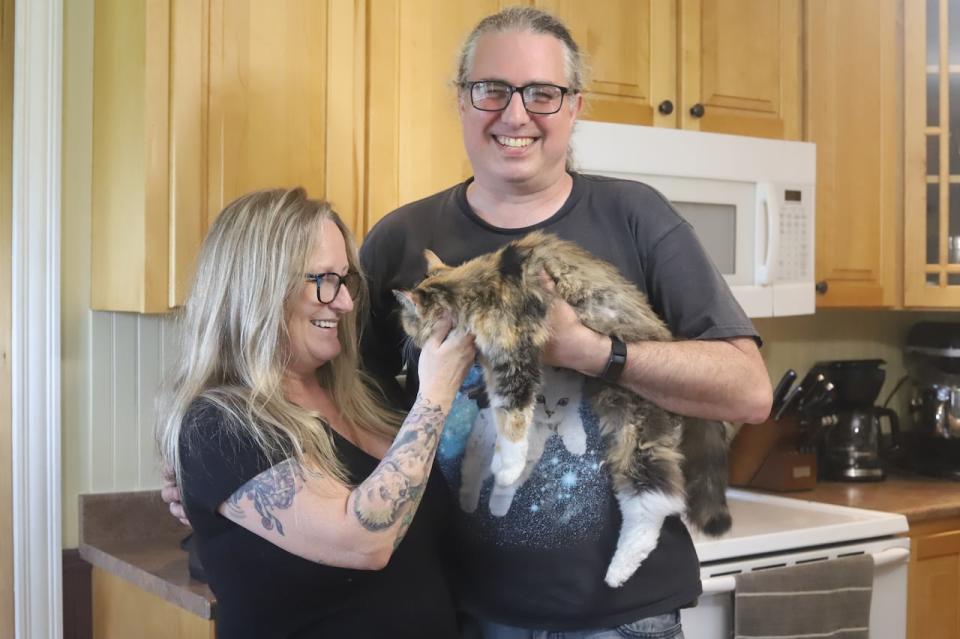
The condition really started to affect Bagel's vision about four years ago, but because she was already a senior, Jargo decided not to risk treating the cataracts.
"The risk factor involved in having something like that removed from her at her age wasn't worth it," he said.
Considering the best interest
For Sheri Ross, an internal medicine clinician at the Atlantic Veterinary College at UPEI's campus in Charlottetown, that decision is something she talks through with clients frequently.
"You need to think about what's in your best interest, what's in your animal's best interest. Just because we can do these things doesn't mean we should do these things," she said.

Ross is an expert when it comes to kidney disease in cats, and she's had her fair share of experience with senior cats over the years. Her own feline friend, Kramer, lived to 21.
"He was with me throughout a lot," she said. "He was diabetic, he had chronic kidney disease, he had a feeding tube for five years.
"It sounds insane, but if you could see this cat — he was happy."
Age of seniority
The typical lifespan of a cat ranges based on a few factors, says Ross. Indoor cats often live longer because there's no risk from predators or vehicles, and cats that are spayed or neutered have a lower chance of reproductive disease, or injuries from mating and bearing kittens.

"On average for indoor cats, usually you can expect the lifespan of somewhere like 15 to 16 years," Ross said.
While people often compare "dog years" and "cat years" to the average human lifespan, Ross says that's not necessarily accurate.
"The first year of a cat's life is about 14 to 15 years. So by the time they're a year old, they're a rowdy teenager," she said. "The next year is probably about nine years."
After that, each year is somewhere between one and four "cat years."
So when is a cat considered old?
"Surprisingly, it's earlier than most people think," Ross said. "Eight years, nine years of age is considered senior for most cats."
That's when you should probably start thinking about annual checkups and blood work for your cat, to check for things like kidney disease, hyperthyroidism and diabetes.
"If you're a cat in the teens, you've got almost a 50 per cent chance of having chronic kidney disease," Ross said. "It's not a fixable disease, but it's a manageable disease, and we can keep them feeling better longer if we know about it earlier."
'She's pretty spry'
When Mike Burck was living in Edmonton in his late 20s, he took a trip to the local SPCA to pick out his first cat.
"I wanted to have a young one so I could teach it," he said.
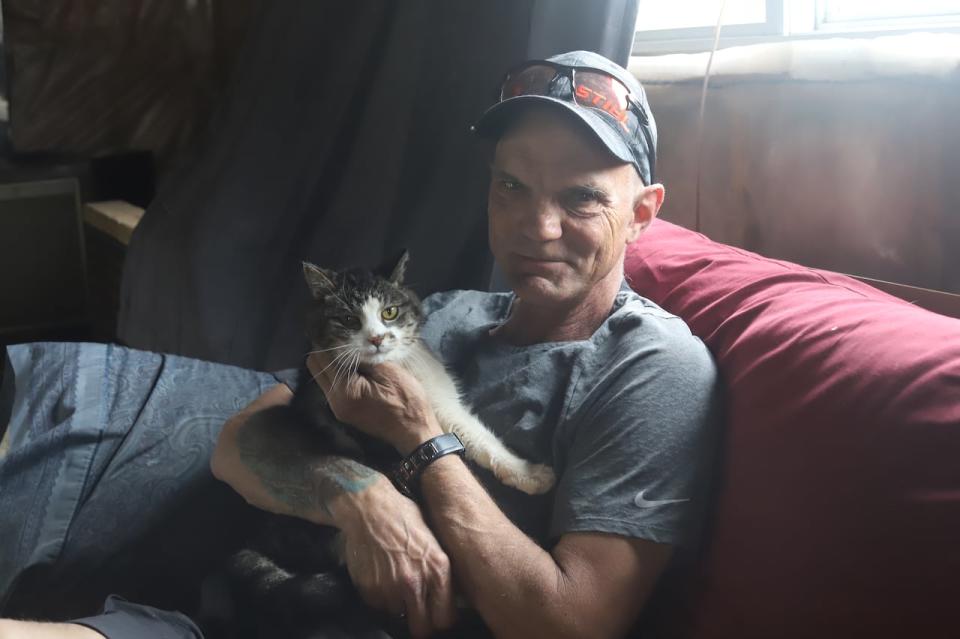
He was ready to do the paperwork to adopt a two-year-old cat when he spotted two kittens, and one particularly caught his eye.
"She looked at me, and I looked at her, and she meowed at me," he said.
I kind of wonder if she's going to outlive me. — Mike Burck
A few hours later, he took home the six-month-old kitten and named her Kitty. It was 1999.
Although Kitty will turn 25 in July, Burck says she still acts like a teenager sometimes, waking him up in the morning and meowing for dinner at 5 o'clock each night.
"She's pretty spry. She likes to go outside for walks," he said.
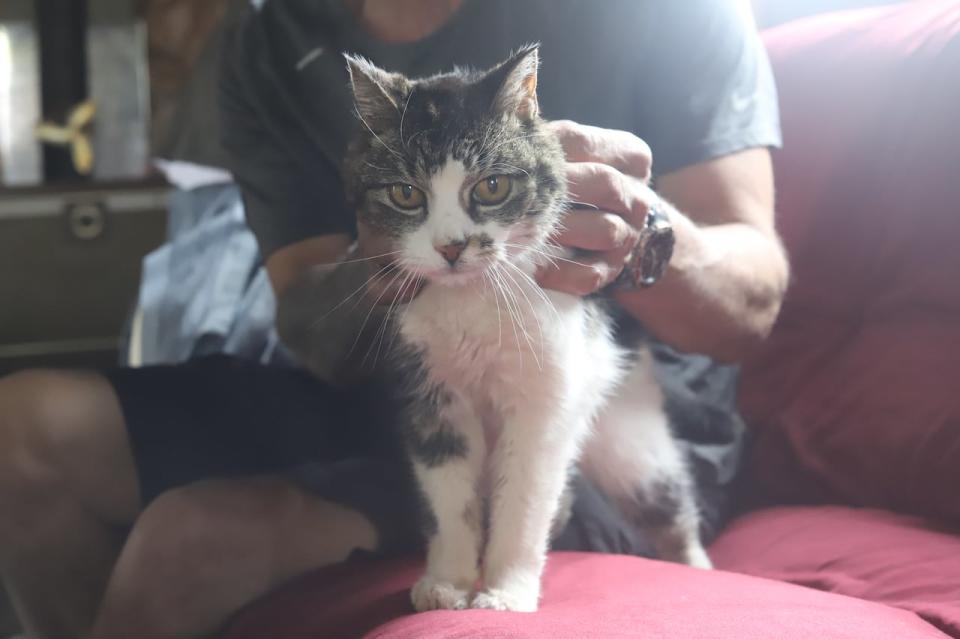
Kitty's days mainly involve curling up on a soft chair in Burck's living room in Morell, chasing a laser pointer every now and then.
Burck says Kitty still has a voracious appetite, but he has seen her decline in the past five years. She's lost most of her hearing and gotten a bit skinnier and more fragile.
"I have to pick her up off the couch sometimes and put her on the floor, because she'll just fall over," he said. "She's not suffering or anything, you know. She's only been to the vet once in her life for anything serious."
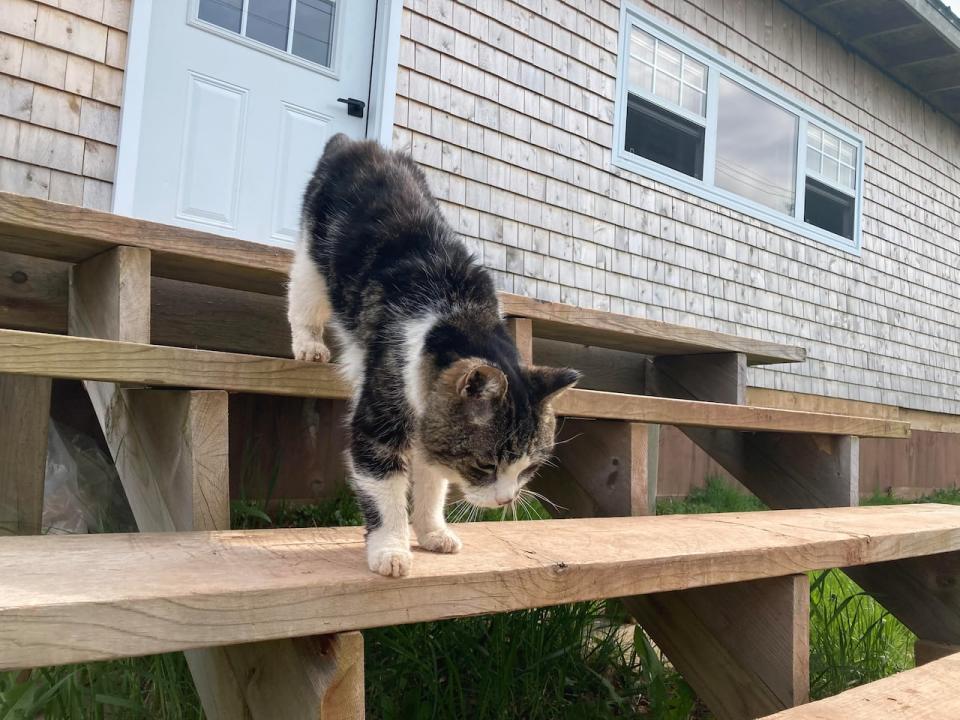
Burck didn't think he'd have Kitty for nearly 25 years, but he's glad he brought her home that day.
"She doesn't leave my side too often, as you can see. She's pretty good that way," he said. "I kind of wonder if she's going to outlive me."
Growing up together
Robin Graham first bonded with her cat Lily when she was a child.
"I'll turn 28 in June and then she'll turn 20 in September," she said.
As the years went by, Lily developed early-stage kidney failure, lost most of her hearing, and developed what vets think is a non-cancerous tumour that occasionally makes her lose her balance.
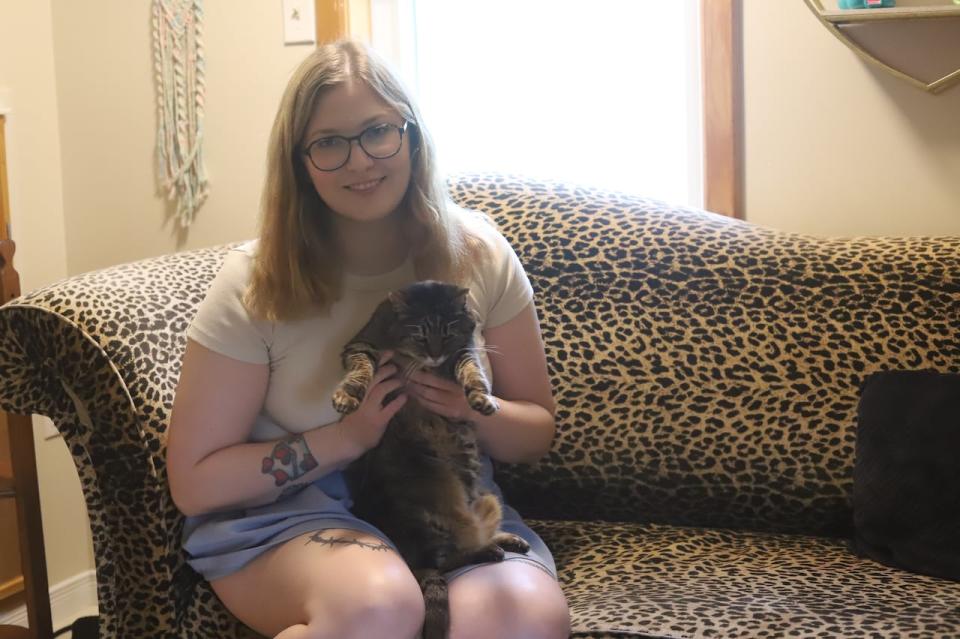
"The wobble doesn't bother her, and I don't live in a place with stairs or anything to try to keep it accessible to her," Graham said. "Which sounds really silly, but you know, the longer you have a cat, you just get to know them and their little quirks. But she is thriving and as long as she's thriving I see no reason to put her down."
The kidney problems mean she drinks a lot of water, but Lily still seems to have spunk — playing with toys and even eating human food.
"She's super social, I would say very curious, very active, weirdly active, loves to take food off my plate like French fries, chicken," Graham said. "The way I see it, she's so old, a bite of a chicken nugget isn't going to hurt her."
Lily is unusually docile for a cat: she doesn't mind having her nails cut, her ears cleaned, or her fur brushed — something Graham now does daily because Lily can't groom herself very well anymore.
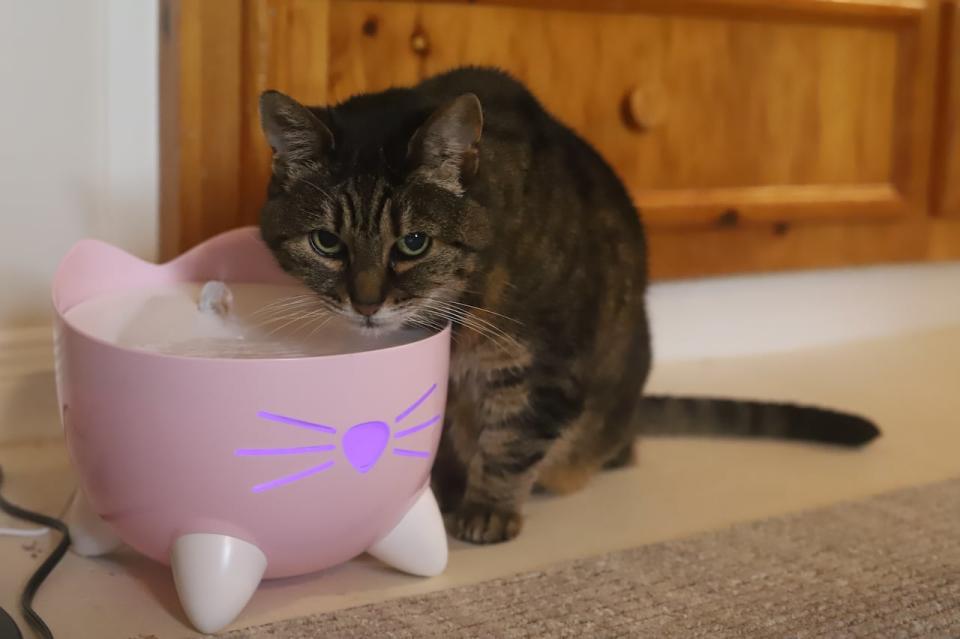
"I don't know if it's her age or just her demeanor, but she literally does not care," Graham said. "I admire that about her."
The bond between Graham and her cat is something she says most people don't get to experience.
"You never think that you'll have your childhood cat until you're almost 30," she said. "That's really unheard of and really special for both of us."
When it's time
Back at the Atlantic Veterinary College, Ross said people should consider end-of-life for an animal that's having more bad days than good days. That time comes at a different age for every animal, and with modern veterinary medicine, many cats are living longer.
"When I first started, it was rare to have an 18-year-old cat. Now it's not rare at all," Ross said.
Just like you wouldn't expect your great-grandmother to run up and down stairs every time she had to pee, you shouldn't make your cat do that either. — Dr. Sheri Ross
But at the same time, the veterinarian is cautious of encouraging people to prolong a pet's life when they're suffering.
"I have said no to chronic dialysis [cat] patients before and people that were more than willing to do it because I didn't think it was in the best interest of the cat," she said.
"And that's a tough position, because in the owner's eyes, you're denying care. It's a hard, hard position to be in."
When it comes to kitties that are getting more senior, Ross does have a few suggestions, including providing a soft, warm bed and keeping needs like food and litter on one floor.
"Just like you wouldn't expect your great-grandmother to run up and down stairs every time she had to pee, you shouldn't make your cat do that either," she said.
'Longest commitment ever'
Robyn Graham thinks of Lily as her "longest commitment ever," and finds it hard to imagine a life without her.
"As long as she's not in pain and she's happy, that's all that matters," Graham said.
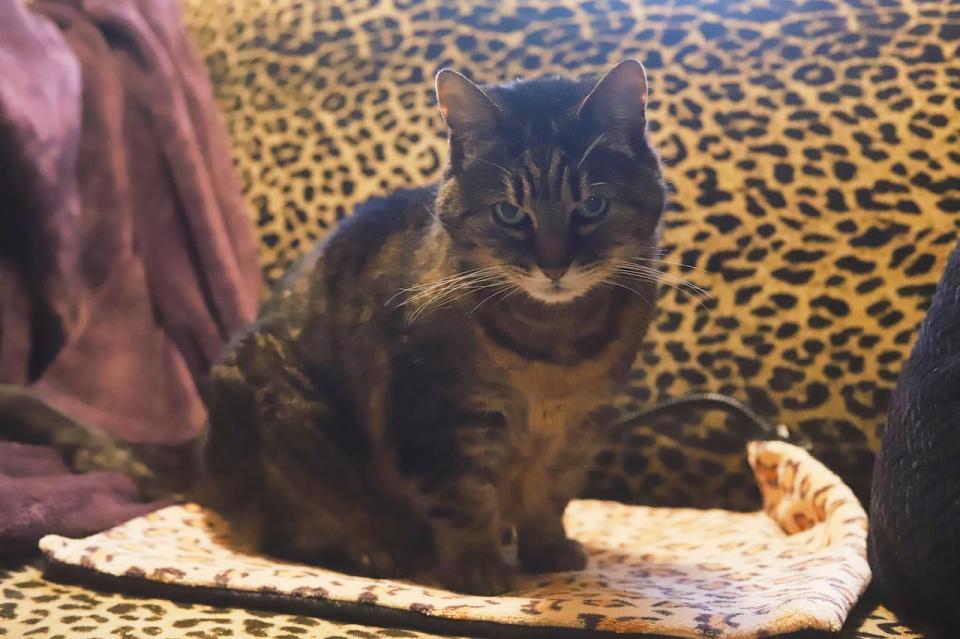
For Aaron Jargo, he's happy as long as Bagel is happy, and that could still be true for a few more months or years yet.
"If she is showing failing signs, whether not urinating or going to the bathroom or not eating or not staying up to a certain level of energy that she has, then we will be happy to give her that graceful exit," he said. "She deserves that respect."
Now in his 50s, Jargo has had Bagel for almost half his life.
"She's been with me through a lot of life changes. She survived hurricanes, tornadoes, floods, ice storms," he said. "I never would have imagined the type of joy she has brought me and everybody else over the lifespan that she's shared with us."


